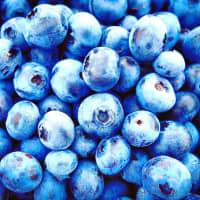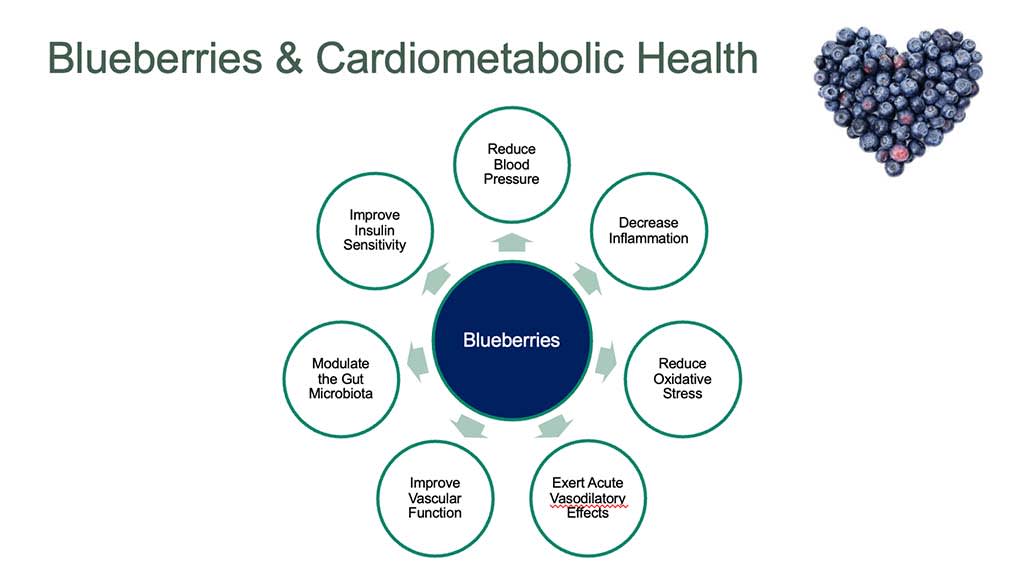Blueberries (Cyanococcus Vaccinium) are all native to North America, and were introduced into Europe in the 1930s.
Healing Properties
Antioxidant
Free radical scavenging.[1]
Polyphenols and polyphenol-rich foods like blueberries can reduce oxidative stress.[2]
Antimicrobial
Polyphenols such as anthocyanins, flavonoids, and phenolic acids are found to have antimicrobial properties.[3]
Antiviral
Blueberry and other berries have proven to be effective against viral infections.[3:1]
Brain Health
The polyphenols and other phytochemicals contained in blueberries can be detected all throughout the brain.[4]
Anti-Glycation
Glycation is associated with several neurodegenerative disorders, including Alzheimer’s disease (AD, where it potentiates the aggregation and toxicity of proteins such as β-amyloid (Aβ).
Brain Plasticity
modulates synaptic plasticity.
Improves cognition
(Prevents cognitive decline) Extract from grape & blueberry attenuates cognitive decline and improves neuronal function.[4:1]
Microglial Neuroprotective
Microglia are a type of glial cell located throughout the brain and spinal cord. Microglia account for 10–15% of all cells found within the brain. Microglia act as the first and main form of active immune defense in the central nervous system.
- Polyphenol & anthocyanin-enriched extracts of berries help protect the brain’s microglia.
- Decreases cytotoxicity in microglia.
Neurogenesis
promotes the growth of newly generated neurons![4:2]
Digestion
Helps cleanse the deep pockets of the intestines.
Gut Health
Probiotic / Prebiotic
There are compounds of anthocyanins in the extracts of blueberries that have probacterial (probiotic) properties.[5]
- Blueberry extract has been shown to activate the growth of all lactobacilli strains.[5:1]
- Lactobacilli are particularly well-recognized as major contributors to improved gut and overall health.
Cardioprotective
Consuming blueberries on a regular basis help improve cardiovascular health.[2:1]
Cardiometabolic Health
Wild blueberry extracts (which have a significantly higher phenolic content compared to commercial blueberries) have been shown to attenuate cardiac cell damage (cardiomyocytes) through reduction in oxidative stress and apoptosis.[6]
A blueberry-enriched diet has been shown to protect the myocardium from induced ischemic damage and demonstrated the potential to attenuate the development of post myocardial infarction chronic heart failure.[7]
Endothelial Health
There is a direct link observed between blueberries’ ability to reduce oxidative stress and improvements in endothelial function and cardiovascular health in humans.[2:3]
Blueberries improved endothelial function through reductions in oxidative stress in the body.[2:4]
Consumption of 22 grams of freeze dried highbush blueberry powder (equivalent to about 1 cup of fresh blueberries) mixed with water taken daily for 12 weeks improved the function of the inner lining of blood vessels (called the endothelium).[2:5]
Disease / Symptom Treatment
Neurodegenerative Diseases
Age-induced cognitive decline
Azheimer’s Disease
Memory deficits (impaired memory)
Metabolic disorders
Type 2 Diabetes
Prevents Ameloydβeta fibrillation.
Improves glucose regulation.
Citations:
Title: Evaluation of Polyphenol Anthocyanin-Enriched Extracts of Blackberry, Black Raspberry, Blueberry, Cranberry, Red Raspberry, and Strawberry for Free Radical Scavenging, Reactive Carbonyl Species Trapping, Anti-Glycation, Anti-β-Amyloid Aggregation, and Microglial Neuroprotective Effects
Publication: International Journal of Moleculary Science
Date: Feb 2018
Study Type: Human Study: In Vitro
Author(s): Hang Ma, Shelby L. Johnson, Weixi Liu, Nicholas A. DaSilva, Susan Meschwitz, Joel A. Dain, and Navindra P. Seeram
Institution(s): Wuyi University, Jiangmen, Guangdong, China; University of Rhode Island, Kingston, Rhode Island, USA; Salve Regina University, Newport, Rhode Island, USA
Copy: archive, archive-mirror ↩︎Title: CSU researcher presents findings in London about blueberries’ lowering effects on cardiovascular disease risk
Institution(s): Functional Foods and Human Health Laboratory, Colorado State University
Publication:Colorado State University College News; International Conference on Polyphenols and Health in London
Date: May 18, 2022
Archive ↩︎ ↩︎ ↩︎ ↩︎ ↩︎ ↩︎Title: Berry derived constituents in suppressing viral infection: Potential avenues for viral pandemic management
Institution(s): University of Illinois, Rockford, IL
Publication: Elsevier: Clinical Nutrition ESPEN
Date: September 28, 2021 ↩︎ ↩︎Title: Polyphenol-rich extract from grape and blueberry attenuates cognitive decline and improves neuronal function in aged mice
Publication: Cambridge University Press: Journal of Nutritional Science
Date: 21 May 2018
Study Type: Animal Study: In Vivo
Author(s): Julien Bensalem, Stéphanie Dudonné, David Gaudout, Laure Servant
Institution(s): Université de Bordeaux, Bordeaux, France; Laval University, Quebec, Canada
Copy: archive, archive-mirror ↩︎ ↩︎ ↩︎Title: Extracts of Edible Plants Stimulators for Beneficial Microorganisms
Publication: National Academy of Sciences of Ukraine: Biotechnologia Acta
Date: July 2019
Study Type: In Vitro
Author(s): O. V. Pallah, T. V. Meleshko, V. V. Bati, N. V. Boyko
Institution(s): Uzhhorod National University, Ukraine; Palladin Institute of Biochemistry of National Academy of Sciences of Ukraine
Copy: archive, archive-mirror ↩︎ ↩︎Title: Blueberry extract attenuates doxorubicin-induced damage in H9c2 cardiac cells
Publication: Canadian Science Publishing: Canadian Journal of Physiology and Pharmacology
Date: July 2019
Study Type: Human Study: In Vitro
Author(s): Yue Sun, Ashley S. Nemec-Bakk, Azim U. Mallik, Ashim K. Bagchi, Pawan K. Singal, Neelam Khaper
Institution(s): Lakehead University, Thunder Bay, Ontario, Canada; University of Manitoba, Winnipeg, Manitoba, Canada
Copy: archive, archive-mirror ↩︎Title: Blueberry-Enriched Diet Protects Rat Heart from Ischemic Damage
Publication: PLOS One
Date: June 2009
Study Type: Animal Study: In Vivo
Author(s): Ismayil Ahmet, Edward Spangler, Barbara Shukitt-Hale, Magdalena Juhaszova, Steven J. Sollott, James A. Joseph, Donald K. Ingram, Mark Talan
Institution(s): National Institutes of Health, Baltimore, Maryland, USA; Tufts University, Boston, Massachusetts, USA
Copy: archive, archive-mirror ↩︎

